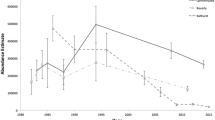Abstract
Gobal climate change may affect wolves in Canada’s High Arctic (80° N) acting through three trophic levels (vegetation, herbivores, and wolves). A wolf pack dependent on muskoxen and arctic hares in the Eureka area of Ellesmere Island denned and produced pups most years from at least 1986 through 1997. However, when summer snow covered vegetation in 1997 and 2000 for the first time since records were kept, halving the herbivore nutrition-replenishment period, muskox and hare numbers dropped drastically, and the area stopped supporting denning wolves through 2003. The unusual weather triggering these events was consistent with global-climate-change phenomena.
Similar content being viewed by others
References
Gitay, H., Suarez, A., Watson, R. T., Dokken, D. J.: 2002, Climate Change and Biodiversity, Intergovernmental Panel on Climate Change, Technical Paper V, World Meterological Organization and United Nations Environment Programme, p. 2, 10, 11.
Grace, E. S.: 1976, ‘Interactions between Men and Wolves at an Arctic Outpost on Ellesmere Island’, Can. Field Nat. 90, 149–156.
Karl, T.: 1999, ‘Weather and Climate Extremes: Changes, Variations and a Perspective from the Insurance Industry — Overview’, Clim. Change 42, 1–2.
Karl, T. R., Nicholls, N., and Gregory, J.: 1997, ‘The Coming Climate’, Scient. Amer., May, 78–83.
Mech, L. D.: 1977, ‘Productivity, Mortality, and Population Trends of Wolves in Northeastern Minnesota’, J. Mammal. 58, 559–574.
Mech, L. D.: 1988, The Arctic Wolf: Living with the Pack, Voyageur Press, Stillwater, Minn.
Mech, L. D.: 1994, ‘Regular and Homeward Travel Speeds of Arctic Wolves’, J. Mammal. 75, 741–742.
Mech, L. D.: 1995, ‘A Ten-year History of the Demography and Productivity of an Arctic Wolf Pack’, Arctic 48, 329–332.
Mech, L. D.: 2000, ‘Lack of Reproduction in Muskoxen and Arctic Hares Caused by Early Winter?’, Arctic 53, 69–71.
Mech, L. D. and DelGiudice, G. D.: 1985, ‘Limitation of the Marrow-fat Technique as an Indicator of Condition’, Wildl. Soc. Bull. 13, 204–206.
Mech, L. D. and Packard, J. M.: 1990, ‘Use of Wolf Den over Several Centuries’, Can. Field Nat. 104, 484–485.
Mech, L. D. and Adams, L. G.: 1999, ‘Killing of a Muskox, Ovibos moschatus, by Two Wwolves, Canis lupus, and Subsequent Caching’, Can. Field Nat. 113, 673–675.
Mech, L. D., Adams, L. G., Meier, T. J., Burch, J. W., and Dale, B. W.: 1998, The Wolves of Denali, Univ. of Minn. Press, Minneapolis, Minn., U.S.A., p. 169.
Parmelee, D. F.: 1964, ‘Myth of the Wolf’, The Beaver 295, 4–9.
Peterson, R. O. and Page, R. E.: 1988, ‘The Rise and Fall of the Isle Royale Wolves’, J. Mammal. 69, 89–99.
Tener, J. S.: 1954, ‘A Preliminary Study of the Musk-oxen of Fosheim Peninsula, N.W.T.’, Can. Wildl. Serv. Wildl. Mgmt. Bull. Ser. 1 9, 17.
Author information
Authors and Affiliations
Rights and permissions
About this article
Cite this article
Mech, L.D. Is climate change affecting wolf populations in the high arctic?. Climatic Change 67, 87–93 (2004). https://doi.org/10.1007/s10584-004-7093-z
Received:
Revised:
Issue Date:
DOI: https://doi.org/10.1007/s10584-004-7093-z




